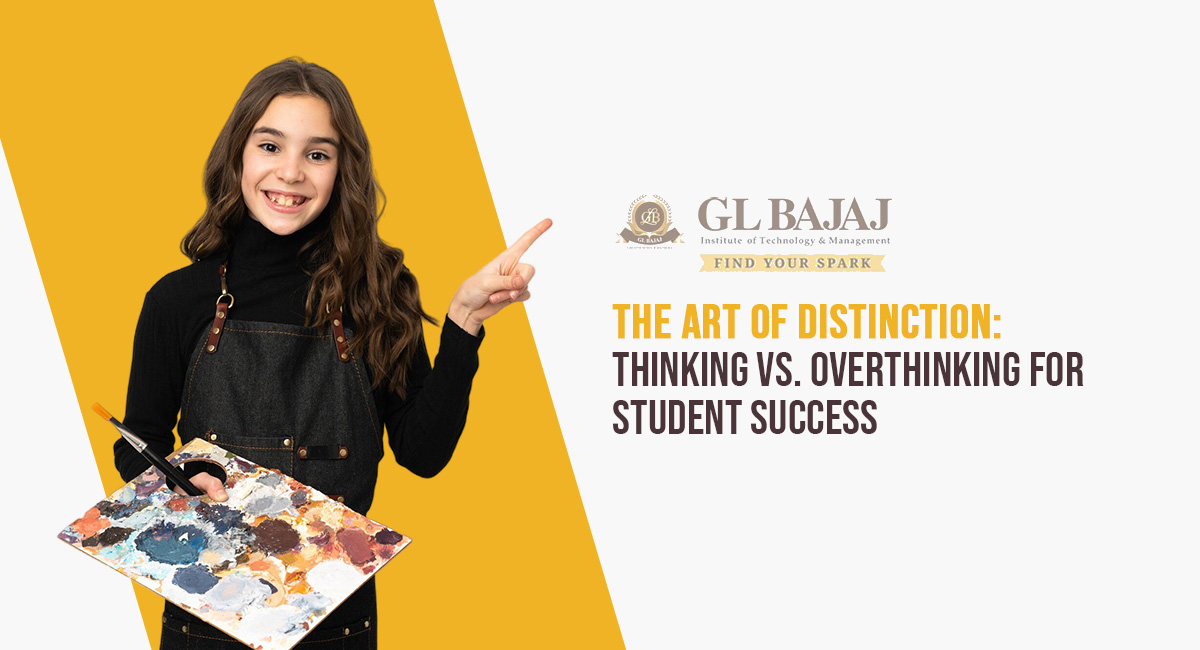The ability to think critically is important but there exists a fine line between thoughtful analysis and over analysis, commonly known as overthinking. For students going through the complexities of academic life, learning the art of distinction between these two states of mind is very essential for success. Here we will look into the details of thinking versus overthinking, explore strategies for effective differentiation, and discuss the impact it can have on students’ lives.
Understanding Thinking vs. Overthinking:
Thinking involves the process of analyzing information, evaluating options, and generating understanding to make informed decisions. It is a constructive and purposeful activity that promotes intellectual growth and problem-solving skills. On the other hand, overthinking refers to visiting excessively on a subject or problem, often leading to negative outcomes such as anxiety, indecision, and mental exhaustion. While thinking enables productivity and innovation, overthinking can delay progress and hamper academic performance.
Practicing Effective Distinction:
1. Mindfulness: Cultivate awareness of your thoughts and emotions. Notice when your mind starts spiralling into repetitive or unproductive patterns of thinking. Mindfulness techniques such as meditation and deep breathing can help ground you in the present moment and ease overthinking tendencies.
2. Set Boundaries: Establish clear boundaries for your study and leisure time. Allocate specific periods for focused thinking and problem-solving, and designate breaks for relaxation and renewal. Creating a balance between work and play is essential for maintaining mental clarity and preventing burnout.
3. Welcome Imperfection: Accept that perfection is unattainable and mistakes are inevitable. Instead of fixating on flaws or setbacks, view them as opportunities for growth and learning. Adopt a growth mind-set that values progress over perfection, and celebrate your achievements, no matter how small.
4. Desire Perspective: Engage in open dialogue with peers, mentors, or counsellors to gain fresh perspectives on challenging situations. Collaborative brainstorming and constructive feedback can help broaden your outlook and alleviate feelings of isolation or self-doubt.
5. Practice Self-Compassion: Be kind to yourself during moments of self-doubt or uncertainty. Treat yourself with the same compassion and understanding that you would offer to a friend facing similar challenges. Practice self-care activities that nourish your mind, body, and soul, such as exercise, hobbies, or spending time in nature.
The Impact on Student Lives:
Effectively distinguishing between thinking and overthinking can deeply impact students’ academic performance, mental well-being, and overall quality of life. By cultivating a healthy thinking mind-set, students can:
– Enhance Academic Success: Clear thinking facilitates efficient problem-solving, decision-making, and information retention, leading to improved academic performance and higher grades.
– Reduce Stress and Anxiety: Minimizing overthinking reduces stress levels and promotes emotional resilience, enabling students to guide academic challenges with greater ease and confidence.
– Foster Creativity and Innovation: By freeing the mind from the shackles of over analysis, students can express their creativity and explore new ideas and perspectives, enabling innovation and intellectual curiosity.
– Cultivate Healthy Relationships: Overthinking can strain interpersonal relationships by fuelling insecurities, mistrust, and communication barriers. By practicing mindful thinking, students can build stronger connections based on mutual respect, empathy, and understanding.
In conclusion, mastering the art of distinction between thinking and overthinking is a valuable skill that empowers students to thrive academically, emotionally, and socially. By practicing mindfulness, setting boundaries, embracing imperfection, seeking perspective, and practicing self-compassion, students can cultivate a healthy thinking mind-set that promotes academic success, reduces stress, fuels creativity, and nurtures healthy relationships.
